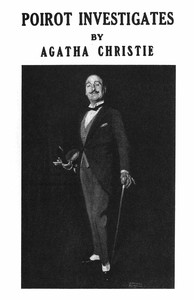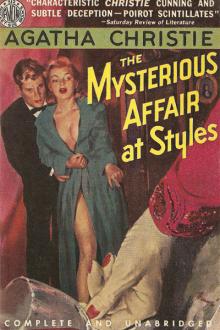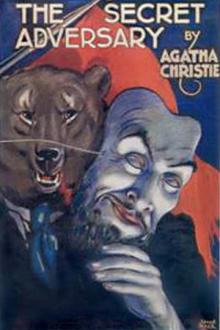Poirot Investigates by Agatha Christie (10 ebook reader .TXT) 📗

- Author: Agatha Christie
Book online «Poirot Investigates by Agatha Christie (10 ebook reader .TXT) 📗». Author Agatha Christie
“There is one in the porter’s office downstairs.”
“Get it, then, and, look here, I think you’d better send for the police.”
Poirot approved with a nod of the head.
The man returned shortly; with him came the manager.
“Will you tell me, gentlemen, what is the meaning of all this?”
“Certainly. I received a telephone message from Count Foscatini stating that he had been attacked and was dying. You can understand that we must lose no time—if we are not already too late.”
The manager produced the key without more ado, and we all entered the flat.
We passed first into a small square lounge hall. A door on the right of it was half open. The manager indicated it with a nod.
“The dining-room.”
Dr. Hawker led the way. We followed close on his heels. As we entered the room I gave a gasp. The round table in the centre bore the remains of a meal; three chairs were pushed back, as though their occupants had just risen. In the corner, to the right of the fire-place, was a big writing-table, and sitting at it was a man—or what had been a man. His right hand still grasped the base of the telephone, but he had fallen forward, struck down by a terrific blow on the head from behind. The weapon was not far to seek. A marble statuette stood where it had been hurriedly put down, the base of it stained with blood.
The doctor’s examination did not take a minute. “Stone dead. Must have been almost instantaneous. I wonder he even managed to telephone. It will be better not to move him until the police arrive.”
On the manager’s suggestion we searched the flat, but the result was a foregone conclusion. It was not likely that the murderers would be concealed there when all they had to do was to walk out.
We came back to the dining-room. Poirot had not accompanied us in our tour. I found him studying the centre table with close attention. I joined him. It was a well-polished round mahogany table. A bowl of roses decorated the centre, and white lace mats reposed on the gleaming surface. There was a dish of fruit, but the three dessert plates were untouched. There were three coffee-cups with remains of coffee in them—two black, one with milk. All three men had taken port, and the decanter, half-full, stood before the centre plate. One of the men had smoked a cigar, the other two cigarettes. A tortoiseshell-and-silver box, holding cigars and cigarettes, stood open upon the table.
I enumerated all these facts to myself, but I was forced to admit that they did not shed any brilliant light on the situation. I wondered what Poirot saw in them to make him so intent. I asked him.
“Mon ami,” he replied, “you miss the point. I am looking for something that I do not see.”
“What is that?”
“A mistake—even a little mistake—on the part of the murderer.”
He stepped swiftly to the small adjoining kitchen, looked in, and shook his head.
“Monsieur,” he said to the manager, “explain to me, I pray, your system of serving meals here.”
The manager stepped to a small hatch in the wall.
“This is the service lift,” he explained. “It runs to the kitchens at the top of the building. You order through this telephone, and the dishes are sent down in the lift, one course at a time. The dirty plates and dishes are sent up in the same manner. No domestic worries, you understand, and at the same time you avoid the wearying publicity of always dining in a restaurant.”
Poirot nodded.
“Then the plates and dishes that were used to-night are on high in the kitchen. You permit that I mount there?”
“Oh, certainly, if you like! Roberts, the lift man, will take you up and introduce you; but I’m afraid you won’t find anything that’s of any use. They’re handling hundreds of plates and dishes, and they’ll be all lumped together.”
Poirot remained firm, however, and together we visited the kitchens and questioned the man who had taken the order from Flat ii.
“The order was given from the à la carte menu—for three,” he explained. “Soup julienne, filet de sole normande, tournedos of beef, and a rice soufflé. What time? Just about eight o’clock, I should say. No, I’m afraid the plates and dishes have been all washed up by now. Unfortunate. You were thinking of finger-prints, I suppose?”
“Not exactly,” said Poirot, with an enigmatical smile. “I am more interested in Count Foscatini’s appetite. Did he partake of every dish?”
“Yes; but of course I can’t say how much of each he ate. The plates were all soiled, and the dishes empty—that is to say, with the exception of the rice soufflé. There was a fair amount of that left.”
“Ah!” said Poirot, and seemed satisfied with the fact.
As we descended to the flat again he remarked in a low tone:
“We have decidedly to do with a man of method.”
“Do you mean the murderer, or Count Foscatini?”
“The latter was undoubtedly an orderly gentleman. After imploring help and announcing his approaching demise, he carefully hung up the telephone receiver.”
I stared at Poirot. His words now and his recent inquiries gave me the glimmering of an idea.
“You suspect poison?” I breathed. “The blow on the head was a blind.”
Poirot merely smiled.
We re-entered the flat to find the local inspector of police had arrived with two constables. He was inclined to resent our appearance, but Poirot calmed him with the mention of our Scotland Yard friend, Inspector Japp, and we were accorded a grudging permission to remain. It was a lucky thing we were, for we had not been back five minutes before an agitated middle-aged man came rushing into the room with every appearance of grief and agitation.
This was Graves, valet-butler to the late Count Foscatini. The story he had to tell was a sensational one.
On the previous morning, two gentlemen had called to see his master. They were Italians, and the elder of the two, a man of about forty, gave his name as Signor Ascanio. The younger was a well-dressed lad of about twenty-four.
Count Foscatini was evidently prepared for their visit and immediately sent Graves out upon some trivial errand. Here the man paused and hesitated in his story. In the end, however, he admitted that, curious as to the purport of the interview, he had not obeyed immediately, but had lingered about endeavouring to hear something of what was going on.
The conversation was carried on in so low a tone that he was not as successful as he had hoped; but he gathered enough to make it clear that some kind of monetary proposition was being discussed, and that the basis of it was a threat. The discussion was anything but amicable. In the end, Count Foscatini raised his voice slightly, and the listener heard these words clearly:
“I have no time to argue further now, gentlemen. If you will dine with me to-morrow night at eight o’clock, we will resume the discussion.”
Afraid of being discovered listening, Graves had then hurried out to do his master’s errand. This evening the two men had arrived punctually at eight. During dinner they had talked of indifferent matters—politics, the weather, and the theatrical world. When Graves had placed the port upon the table and brought in the coffee his master told him that he might have the evening off.
“Was that a usual proceeding of his when he had guests?” asked the inspector.
“No, sir; it wasn’t. That’s what made me think it must be some business of a very unusual kind that he was going to discuss with these gentlemen.”
That finished Graves’s story. He had gone out about 8.30, and, meeting a friend, had accompanied him to the Metropolitan Music Hall in Edgware Road.
Nobody had seen the two men leave, but the time of the murder was fixed clearly enough at 8.47. A small clock on the writing-table had been swept off by Foscatini’s arm, and had stopped at that hour, which agreed with Miss Rider’s telephone summons.
The police surgeon had made his examination of the body, and it was now lying on the couch. I saw the face for the first time—the olive complexion, the long nose, the luxuriant black moustache, and the full red lips drawn back from the dazzlingly white teeth. Not altogether a pleasant face.
“Well,” said the inspector, refastening his notebook. “The case seems clear enough. The only difficulty will be to lay our hands on this Signor Ascanio. I suppose his address is not in the dead man’s pocket-book by any chance?”
As Poirot had said, the late Foscatini was an orderly man. Neatly written in small, precise handwriting was the inscription, “Signor Paolo Ascanio, Grosvenor Hotel.”
The inspector busied himself with the telephone, then turned to us with a grin.
“Just in time. Our fine gentleman was off to catch the boat train to the Continong. Well, gentlemen, that’s about all we can do here. It’s a bad business, but straightforward enough. One of these Italian vendetta things, as likely as not.”
Thus airily dismissed, we found our way downstairs. Dr. Hawker was full of excitement.
“Like the beginning of a novel, eh? Real exciting stuff. Wouldn’t believe it if you read about it.”
Poirot did not speak. He was very thoughtful. All the evening he had hardly opened his lips.
“What says the master detective, eh?” asked Hawker, clapping him on the back. “Nothing to work your grey cells over this time.”
“You think not?”
“What could there be?”
“Well, for example, there is the window.”
“The window? But it was fastened. Nobody could have got out or in that way. I noticed it specially.”
“And why were you able to notice it?”
The doctor looked puzzled. Poirot hastened to explain.
“It is to the curtains I refer. They were not drawn. A little odd, that. And then there was the coffee. It was very black coffee.”
“Well, what of it?”
“Very black,” repeated Poirot. “In conjunction with that let us remember that very little of the rice soufflé was eaten, and we get—what?”
“Moonshine,” laughed the doctor. “You’re pulling my leg.”
“Never do I pull the leg. Hastings here knows that I am perfectly serious.”
“I don’t know what you are getting at, all the same,” I confessed. “You don’t suspect the manservant, do you? He might have been in with the gang, and put some dope in the coffee. I suppose they’ll test his alibi?”
“Without doubt, my friend; but it is the alibi of Signor Ascanio that interests me.”
“You think he has an alibi?”
“That is just what worries me. I have no doubt that we shall soon be enlightened on that point.”
The Daily Newsmonger enabled us to become conversant with succeeding events.
Signor Ascanio was arrested and charged with the murder of Count Foscatini. When arrested, he denied knowing the Count, and declared he had never been near Regent’s Court either on the evening of the crime or on the previous morning. The younger man had disappeared entirely. Signor Ascanio had arrived alone at the Grosvenor Hotel from the Continent two days before the murder. All efforts to trace the second man failed.
Ascanio, however, was not sent for trial. No less a personage than the Italian Ambassador himself came forward and testified at the police-court proceedings that Ascanio had been with him at the Embassy from eight till nine that evening. The prisoner was discharged. Naturally, a lot of people thought that the crime was a political one, and was being deliberately hushed up.
Poirot had taken a keen interest in all these points. Nevertheless, I was somewhat surprised when he suddenly informed me one morning that he was expecting a visitor at eleven o’clock, and that that visitor was none other than Ascanio himself.
“He wishes to consult you?”
“Du tout, Hastings. I wish to consult him.”
“What about?”
“The Regent’s Court murder.”
“You are going to prove that he did it?”
“A man cannot be tried twice for murder, Hastings. Endeavour to have the common sense. Ah, that is our friend’s ring.”
A few minutes later Signor Ascanio was ushered in—a small, thin man with a secretive and furtive glance in his eyes. He remained standing, darting suspicious glances from one to the other of us.
“Monsieur Poirot?”
My little friend tapped himself gently on the chest.
“Be seated, signor. You received my note. I am determined to get to the bottom of this mystery. In some small measure you can aid me. Let us commence. You—in company with a friend—visited the late Count Foscatini on the morning of Tuesday the 9th——”
The Italian made an angry gesture.
“I did nothing of the sort. I have sworn in court——”
“Précisément—and I have a little idea that you have sworn falsely.”
“You threaten me? Bah! I have nothing to fear from you. I have been acquitted.”
“Exactly; and as I am not an imbecile, it is not with the gallows I threaten you—but with publicity. Publicity! I see that you do not like the word. I had an idea that you would not. My little ideas, you know, they are very valuable to me. Come, signor, your only chance is to be frank with me. I do not ask to know whose indiscretions brought you to England. I know this much, you came for the especial purpose of seeing Count Foscatini.”
“He was not a count,” growled the Italian.
“I have already noted the fact that his name does not appear in the Almanach de Gotha. Never mind, the title of count is often useful in the profession of blackmailing.”
“I suppose I might as well be frank.





Comments (0)